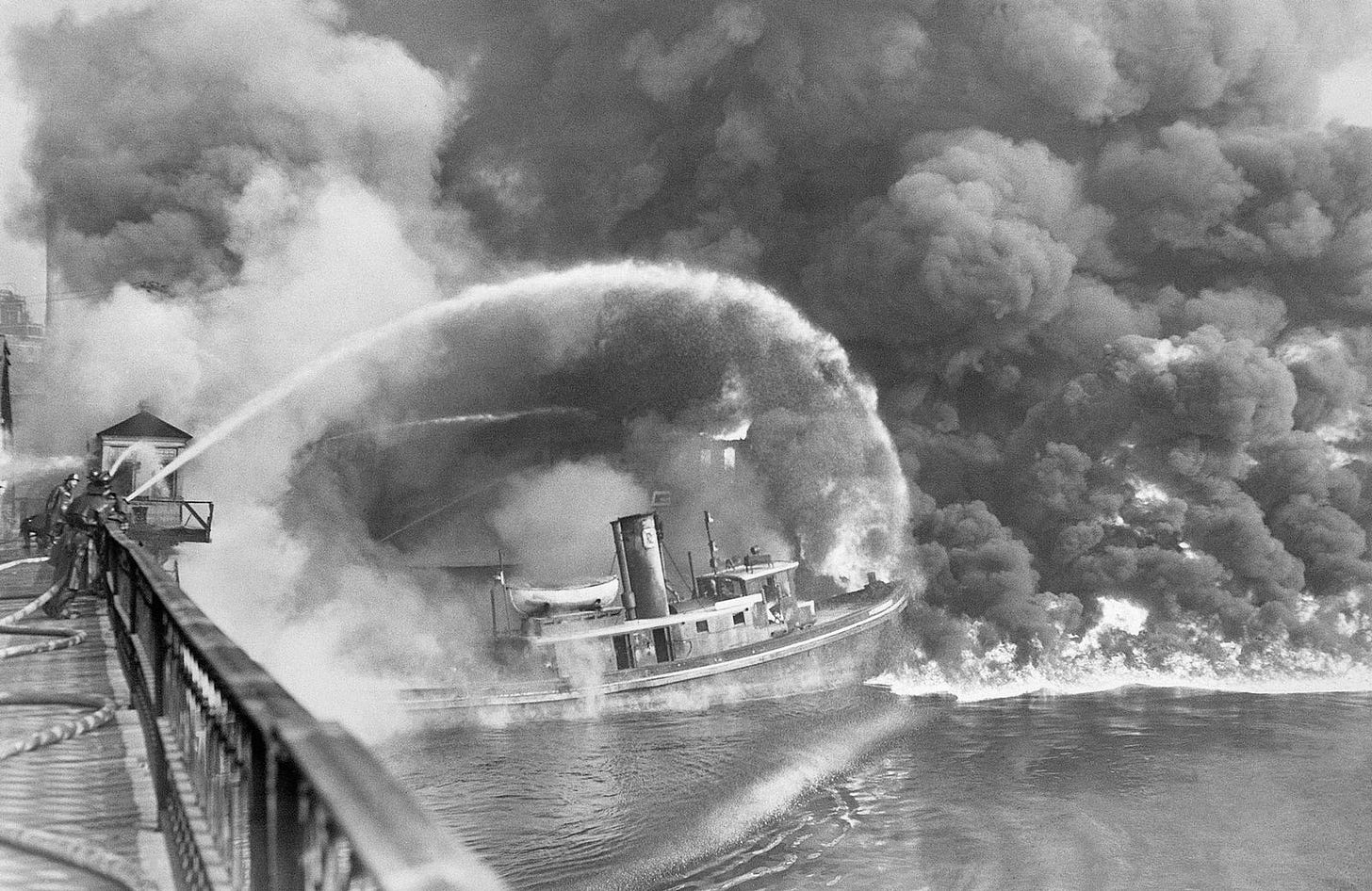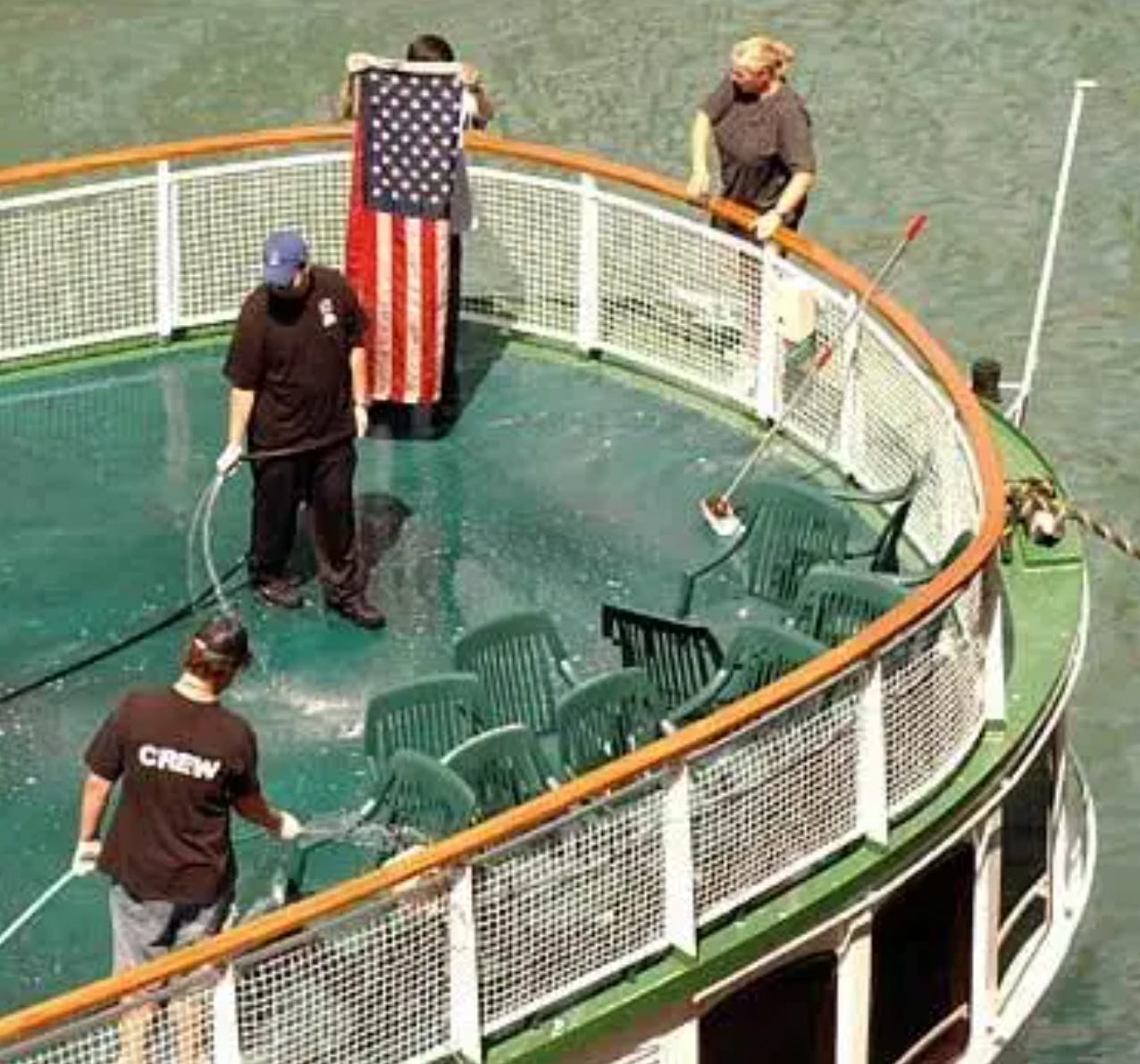Rollin' on the River
Cuyahoga, Chicago, Missouri, Shenandoah Rivers Incidents
On June 22, 1969, fifty-five years ago this summer, Ohio’s Cuyahoga River, which cuts across Cleveland into Lake Erie, caught on fire.
More specifically, an oil slick on the river caught on fire.
The manufacturing industry was doing well in Cleveland, the industry created pollution, and some of that pollution went into the water. It wasn’t even the first, second, or third time it had happened. The Cuyahoga River caught on fire at least a dozen times. But this particular incident made National Geographic and Time, which described the Cuyahoga as a river that “oozes rather than flows” and a place where a person “does not drown but decays.”
Less than a year later, the Environmental Protection Agency was created in January 1970 and the first Earth Day was observed on April 22, 1970.
In 1972, singer, songwriter, and film composer Randy Newman released his breakthrough album Sail Away, which includes the song “Burn On” about the burning of the Cuyahoga River.
“Now the Lord can make you tumble
And the Lord can make you turn
And the Lord can make you overflow
But the Lord can't make you burnBurn on, big river, burn on
Burn on, big river, burn on”
The song starts with an unsettling chromatic motif then slips into a driving stately oompah tune with an anthemic bridge altogether creating a musical work that wouldn’t sound out of place on a compilation of 1920s or ‘30s recordings, juxtaposed with lyrics that take place in 1969 giving it an anachronistic touch.
Though Newman’s song is the first to spring to mind, a few other recording artists were inspired by the incident as well.
On the same day the Cuyahoga River was burning, American entertainer Judy Garland was found dead in her London home from an overdose.
She performed the traditional folk song, “Oh, Shenandoah,” on an episode of her CBS program “The Judy Garland Show” that aired on January 12, 1964. (That same day, Jeff Bezos was born. He would one day be founder of Amazon.com, Inc. and become a billionaire who traveled to space proclaiming upon return, “We need to take all heavy industry, all polluting industry, and move it into space and keep Earth as this beautiful gem of a planet that it is.”)
The song, “Oh, Shenandoah,” first appeared as "Shenadore" in The New Dominion Monthly in April 1876 by Captain Robert Chamblet Adams (author of History of the United States in Rhyme), who said he had first heard the song around 1850. W.B. Whall reprinted it in his 1910 book Ships, Sea Songs and Shanties Collected by W.B. Whall, Master Mariner. The lyrics tell the story of a canoeing voyageur, or fur trader, who was in love with the daughter of a Native American chief. These 16th and 17th century voyageurs gave weapons, tools, and money to Native Americans around the Great Lakes in exchange for animal furs. They typically sang while paddling their canoes along the Mississippi River and its tributaries, including the Missouri.
This summer, the Kansas Department of Health and Environment warned Kansas City residents to avoid the Missouri because raw sewage leaked into the river.
In 2007, the Virginia legislature rejected “Oh, Shenandoah” as the state's official song because it made obvious references to “Missouri,” as in, the Missouri River.
In 2017, a report by the Environmental Integrity Project contended the state of Virginia needed to do more to keep the polluted runoff in check in the Shenandoah Valley, and to require fencing of cattle away from nearby waterways. Both issues impair water quality and put at risk those who enjoy the Shenandoah River and its tributaries. The report estimated that 528,000 dairy and beef cattle in the valley generated one billion gallons of liquid manure annually, which is then piled on so heavily that crops can’t absorb all the nutrients, especially phosphorus, leading to runoff into nearby streams and rivers. Furthermore, the Shenandoah Valley waterways failed the recreational standards of E. Coli bacteria, commonly found in animal manure.
Twenty years ago today, a charter tour bus belonging to the Dave Matthews Band drove across the Kinzie Street Bridge and emptied its septic tank over the Chicago River. The sewage flowed through the bridge’s grates and splattered onto more than 100 people on a sightseeing boat, Chicago’s Little Lady, operated by the Chicago Architecture Foundation.
The band had a concert the night before at the Alpine Valley Music Theatre in East Troy, Wisconsin, where they performed songs including “Joyride.”
“Nothing's obscene if we only close our eyes
Boys and girls welcome to this joyride,
It's a joyride, this joyride, it's a joyride”
Stefan Wohl, the band’s tour bus driver, pleaded guilty to charges of reckless conduct and discharging contaminates to cause water pollution. He was penalized with eighteen months on probation, 150 hours of community service, and a $10,000 fine to Friends of the Chicago River.
The boat headed back to dock with a quickness, ignoring the wake zone. Passengers vomited over the side of the boat. Reportedly, “a motorcyclist with his helmet upturned had to dump it out overboard.”
According to this oral history, “about two-thirds of the passengers on the architecture tour were hit with the brownish-yellow liquid from the bus. Some of the waste ended up in passengers’ eyes and mouths and soaked their hair and clothing. Five individuals went to Northwestern Memorial Hospital for tests.”
Matthews, who has covered Randy Newman’s “Sail Away,” has since apologized multiple times for the incident.
While no one to my knowledge has written a song about the Dave Matthews Band Chicago River Incident, as Newman and others have for the burning of the Cuyahoga River, the 1960s satirical counterculture rock band the Fugs, however, did write and record the comedic gospel song “Wide, Wide River” a.k.a. “River of Shit.”
“River of shit
River of shit
Flow on, flow on, river of shit
Right from my toes
On up to my nose
Flow on, flow on, river of shit
I've been swimming in this river of shit
More than twenty years, and I'm getting tired of it
Don't like swimming, hope it'll soon run dry
Got to go on swimming, ‘cause I don't want to die”
Both The Fugs’ album It Crawled into My Hand, Honest, on which this song appears, and Randy Newman’s eponymous debut album were released in the U.S. by Reprise Records in 1968. Again, Sail Away was released in 1972, the same year the Clean Water Act was amended, expanded, and reorganized, establishing the basic structure for regulating pollutant discharges into the waters of the United States.
Presently, efforts are continuously being made to improve the qualities of the Chicago, Cuyahoga, Missouri, and Shenandoah Rivers.




